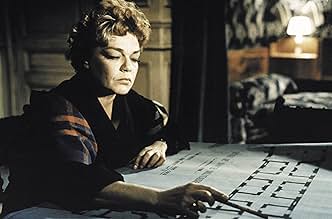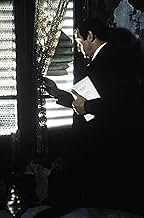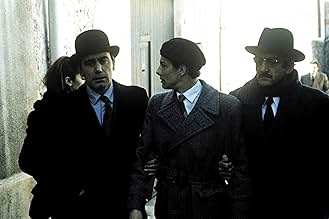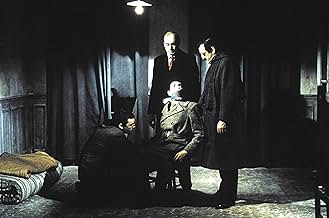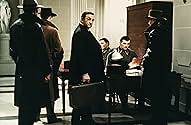Francia, 1942. Philippe Gerbier è un leader della resistenza francese. Attraverso i suoi occhi vediamo la resistenza con gli intrighi e lo spionaggio, la costante minaccia di essere catturat... Leggi tuttoFrancia, 1942. Philippe Gerbier è un leader della resistenza francese. Attraverso i suoi occhi vediamo la resistenza con gli intrighi e lo spionaggio, la costante minaccia di essere catturati dai tedeschi e le decisioni difficili.Francia, 1942. Philippe Gerbier è un leader della resistenza francese. Attraverso i suoi occhi vediamo la resistenza con gli intrighi e lo spionaggio, la costante minaccia di essere catturati dai tedeschi e le decisioni difficili.
- Regia
- Sceneggiatura
- Star
- Premi
- 4 vittorie e 1 candidatura in totale
Recensioni in evidenza
Every episode in the film seems to lead to a darkly ironic conclusion, and the meaninglessness of their efforts becomes almost overwhelming, except that, somehow, these ordinary people continue to offer resistance in the face of death, so that their heroism lies not in the ability to stop the Germans but in taking action at all while facing the abyss.
While the acting is excellent all around, Lino Ventura's performance as Gerbier deserves special attention. It's hard to imagine any other actor bearing the tremendous weight of this film as well as he does. Gabin, at an earlier age, might have had the physical and emotional strength, but I'm not sure he would've been capable of Ventura's unassuming portrayal, which is so necessary for his character. The "shadows" at the core of this tale are seriously dark, and Ventura's Gerbier is strong enough to face them, yet modest enough to realize he can't conquer them on his own. The only way the Resistance makes sense by the end of this film, is in the collective effort of its members. Similarly, each of us, individually, cannot conquer death, but we as a group of human beings can continue to live on. _L'Armée des ombres_ ultimately moves beyond a story of the French Resistance in World War II and serves as a powerful existentialist epic, with Ventura's performance responsible for much of the film's dignity and humanity.
As with _Léon Morin, prêtre_ (1961), another story set during the war, Melville seems more emotionally present in _L'Armée des ombres_ than he does in his policiers or noir pieces, and after seeing the film, his overall body of work suddenly seems much heftier. While the movie isn't as visually daring of some of his other works, it has a dark beauty all its own, and his pacing, editing, shot selection, and use of sound show him in great artistic control. Forty-eight hours after seeing it, I still find myself caught in its world.
'L'armee des ombres' (aka The Shadow Army) is Jean Pierre Melville 1969 masterpiece and does not deal with gangsters. The film is a mix of the director's war time experiences in the French Resistance and Joseph Kessel successful wartime novel. What is remarkable about this film is that Melville turned a mosaic of anecdotes that Kessel's novel is all about into a great, dark epic.
From the chilling opening shot of Germans marching down the Champs-Elysées to the final scene involving the fellow Resistant Mathilde (the great Simone Signoret) the film seems to demonstrate that fighting for an ideal often leads towards death and solitude. What Melville does successfully is to show those dead-ends the way they occur to their protagonist (very simply and minimalist), however more than showing them Mr. Melville managed to make these realities (death and solitude) an equally tragic experienced for the audience...
'L'armee des ombres' is Melville's most moving film, a monument to the spirit of the Resistance rather than its actuality. A poignant drama with a strong performance from not only Lino Ventura but also Simone Signoret, Paul Meurisse, Jean Pierre Cassel, Claude Mann, Paul Crauchet to name a few.
This is probably Melville's greatest cinematographic achievement and, when fiction becomes reality, when actors leave behind their egos to resurrect into heroes, when the colors of the film mirror the one of the soul and when silence becomes music, true cinema has been achieved 'L'armee des ombres' is a terrible yet powerful experience in which the words duty, courage, abnegation get charged with meaning
The film is lacking any of that championing of the underdog spirit that infuses so many other stories about scrappy groups resisting the tyranny of the powerful. The members of the French Resistance in this film live like unearthly beings, skittering from one shadowy doorway to another, trying to erase any sign of themselves. The movie suggests that this need for non-existence bleeds into their psychology as well -- the film's main character becomes nearly inhuman in his devotion to the cause and his ability to ruthlessly do away with colleagues when there's a chance that one of them might jeopardize the others. He's not inhuman, but he must do inhuman things, because the desperation of his and his comrades' situations calls for it.
The Criterion Collection's print of the film looks terrific, or at least as terrific as the film's dreary pallet of grey and brown will allow. Melville gives the film an authentic look -- only some scenes set in the London blitz and on an aircraft carrier have a studio set look to them.
A shot of the Arc di Triomphe both opens and closes the film: a symbol of the France that would eventually emerge from the dark days of WWII, or an ironic jab at a country that can't take much credit for fighting off the tyranny of fascism?
Grade: A
Filmed in a cold, documentary-like style, the "Shadow Army" tells the intertwining stories of several members of the French resistance. The movie defies any sort of simple categorization. It is a thriller without being thrilling. It is a spy story without a single gadget. It portrays the tedium of the task without being boring. Finally, it tells a story of heroic courage without the benefit of a single hero. That last point isn't immediately evident and you are free to disagree, of course, but heroes (as defined in the usual movie terms) are hard to come by in this story.
A popular adage goes; one person's terrorist is another person's freedom fighter. This movie serves up proof to that lie. There are true freedom fighters that will never be labeled "terrorist" and you will meet them during the course of this film. The movie makes clear that they, and the ones around them, paid a high price in pursuit of freedom. Not just in life and limb, but in moral conviction. As the movie unfolds, I found myself asking, is this action justified? The answer, of course, is that it most certainly is. The better question is would I, or anyone I know, have the courage to do what had to be done.
The technical aspects of the film are all first rate even though a bit below the best of European cinema at the time. (In some ways, the lack of high definition color and sets give it a feel much more in keeping with the time it portrays.) The actors disappear into their roles and there is not a star-turn to be found.
According to the announcement made before the screening I attended, it is being released in the United States on May 12, 2006, just before the summer blockbuster crush. Why that date and why now, almost 30 years after it was made, I do not know. My guess is it probably has something to do with money. (Doesn't it always?) Whatever the reasons, skip the Tom Cruise vehicle and don't miss the opportunity to see it.
Lo sapevi?
- QuizCinematographer Pierre Lhomme claimed that the last surviving, watchable print of the movie had turned completely pink with age. He later supervised the 2k resolution, digital restoration of the film at the Eclair Laboratories in Paris.
- BlooperIn the London WWII sequence, double yellow lines are visible on the road. These were only introduced in the UK in 1956 and didn't become common until the 1960s; a few of the street signs have a style not known before the 1960s.
- Citazioni
Philippe Gerbier: See you, Comrade.
Legrain: You a communist?
Philippe Gerbier: No. But I do have comrades.
- ConnessioniFeatured in Mémoires pour Simone (1986)
I più visti
Dettagli
- Data di uscita
- Paesi di origine
- Lingue
- Celebre anche come
- El ejército de las sombras
- Luoghi delle riprese
- Bunker de l'armée, Saint-Cyr-l'Ecole, Yvelines, Francia(execution by the Gestapo)
- Aziende produttrici
- Vedi altri crediti dell’azienda su IMDbPro
Botteghino
- Lordo Stati Uniti e Canada
- 861.983 USD
- Fine settimana di apertura Stati Uniti e Canada
- 12.620 USD
- 30 apr 2006
- Lordo in tutto il mondo
- 931.732 USD





